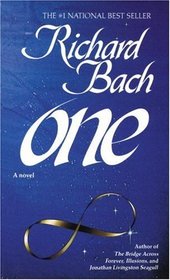Helpful Score: 5
I read "Illusions" by the same author when I was 13 or so, and it opened my eyes to the fearful clinging and self-doubt that prevents so many people from reaching their full potential. Reading "One" twenty years later made me feel ashamed of the opportunities I had let slip past, and of the neglectful way I often treat my future self. It also renewed my resolve to take responsibility for my every dream, doubt, achievement, and failure. And it made me appreciate Richard Bach that much more for writing the two books that have most influenced my outlook on life.
Every choice you make in every moment of your life, whether it's your whim to smile at a stranger in an elevator, your last-minute decision to eat a healthy meal instead of an artery-clogging one, or your whim to read one book and not another affects more than your next few seconds or minutes or hours. It can affect your entire future and the lives of others. I missed this point when I read "Illusions"; "One" drove it home.
"One" isn't as tidy as "Illusions." It introduces a lot of ideas but doesn't follow through on some of them to the extent that "Illusions" did. You may find this either a blessing or a curse, depending on how much material you need before you can run with it on your own.
There's a lot more to the book than what I've mentioned. Some of it bored me and some of it even annoyed me, but that happens when we listen to our best friends speak with candor. Maybe it was something I already knew; maybe it was something I'm not ready to know yet; or maybe it was just plain wrong. Bach shares his soul generously and we're free to take it or leave it. What we learn, or fail to learn, from an experience is also a choice. What I learned in "One" may escape your notice entirely. What I failed to learn may be your epiphany.
Every choice you make in every moment of your life, whether it's your whim to smile at a stranger in an elevator, your last-minute decision to eat a healthy meal instead of an artery-clogging one, or your whim to read one book and not another affects more than your next few seconds or minutes or hours. It can affect your entire future and the lives of others. I missed this point when I read "Illusions"; "One" drove it home.
"One" isn't as tidy as "Illusions." It introduces a lot of ideas but doesn't follow through on some of them to the extent that "Illusions" did. You may find this either a blessing or a curse, depending on how much material you need before you can run with it on your own.
There's a lot more to the book than what I've mentioned. Some of it bored me and some of it even annoyed me, but that happens when we listen to our best friends speak with candor. Maybe it was something I already knew; maybe it was something I'm not ready to know yet; or maybe it was just plain wrong. Bach shares his soul generously and we're free to take it or leave it. What we learn, or fail to learn, from an experience is also a choice. What I learned in "One" may escape your notice entirely. What I failed to learn may be your epiphany.
Helpful Score: 2
In this novel Richard Bach plays with alternate realities. Fantastic ideas about love, war, religion and reality. Lots of fun to read. It's sort of a sequel/companion book to "Bridge Across Forever" but you don't have to have read "Bridge" for this one to work, it stands alone just fine.





